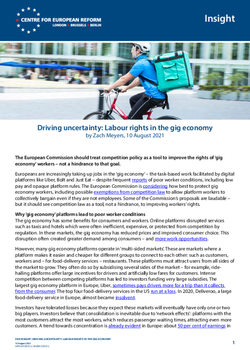
Driving uncertainty: Labour rights in the gig economy
The European Commission should treat competition policy as a tool to improve the rights of ‘gig economy’ workers – not a hindrance to that goal.
Europeans are increasingly taking up jobs in the ‘gig economy’ – the task-based work facilitated by digital platforms like Uber, Bolt and Just Eat – despite frequent reports of poor worker conditions, including low pay and opaque platform rules. The European Commission is considering how best to protect gig economy workers, including possible exemptions from competition law to allow platform workers to collectively bargain even if they are not employees. Some of the Commission’s proposals are laudable – but it should see competition law as a tool, not a hindrance, to improving workers’ rights.
Why ‘gig economy’ platforms lead to poor worker conditions
The gig economy has some benefits for consumers and workers. Online platforms disrupted services such as taxis and hotels which were often inefficient, expensive, or protected from competition by regulation. In these markets, the gig economy has reduced prices and improved consumer choice. This disruption often created greater demand among consumers – and more work opportunities.
However, many gig economy platforms operate in ‘multi-sided markets’. These are markets where a platform makes it easier and cheaper for different groups to connect to each other: such as customers, workers and – for food-delivery services – restaurants. These platforms must attract users from all sides of the market to grow. They often do so by subsidising several sides of the market – for example, ride-hailing platforms offer large incentives for drivers and artificially low fares for customers. Intense competition between competing platforms has led to investors funding very large subsidies. The largest gig economy platform in Europe, Uber, sometimes pays drivers more for a trip than it collects from the consumer. The top four food-delivery services in the US run at a loss. In 2020, Deliveroo, a large food-delivery service in Europe, almost became insolvent.
Investors have tolerated losses because they expect these markets will eventually have only one or two big players. Investors believe that consolidation is inevitable due to ‘network effects’: platforms with the most customers attract the most workers, which reduces passenger waiting times, attracting even more customers. A trend towards concentration is already evident in Europe: about 50 per cent of earnings in Europe’s gig economy derive from the biggest five platforms, and in China, Russia and South East Asia, consolidation is even more severe.
The imperative for ride-hailing and food-delivery platforms to grow rapidly, while sustaining huge losses, has consequences for workers’ rights.
The imperative for ride-hailing and food-delivery platforms to grow rapidly, while sustaining huge losses, has consequences for workers’ rights. Platforms typically claim their workers are independent contractors (although, as described below, these claims have been widely challenged). Independent contractors are not entitled to benefits such as the minimum wage. Platforms can therefore engage new workers with short-term incentives – increasing the platform’s attractiveness to customers – without increasing ongoing costs. This leads to high turnover and unpredictable renumeration for workers (in the US, almost all Uber drivers leave within a year and there is wide variation in drivers’ earnings).
As markets consolidate, leading to fewer competing platforms, pressure for platforms to turn a profit increases. The most successful platforms may therefore try to ‘lock in’ their workers so they won’t use competing platforms. This makes it harder for smaller platforms to grow, and makes it easier for larger platforms to withdraw workers’ incentives and depress labour costs. Platforms may attempt such ‘lock ins’, for example, through:
- Loyalty inducements with requirements to take on a high number of jobs each week.
- Disadvantages for workers who reject jobs while being available (which a worker may do if she is engaged on a job for a different platform).
- Design features, such as encouraging workers to commit to a new job before their current job finishes, so workers do not open up a competing platform’s app.
This strategy might not deliver sustained profitability – Uber recently had to re-introduce short-term worker incentives in the US despite its large market share. But it is the platforms’ only choice: if they hiked prices instead, they would lose customers.
These problems are not unique to the gig economy. Other multi-sided markets can also result in one side being ‘squeezed’. For example, the EU protects merchants from excessive charges when they accept card payments, and the Digital Markets Act proposals would prevent online ‘gatekeepers’ like Google and Facebook treating business users unfairly. However, these are markets that are already consolidated and highly profitable. As Chart 1 shows, the profits of large ride-sharing and food-delivery platforms do not resemble these more mature markets.

Increasing labour costs would therefore damage gig economy platforms. However, there are still good reasons for taking action now. Effective labour regulation could stop platforms from engaging contractors under unsustainable and unpredictable conditions. It could, therefore, support fairer and more sustainable competition.
Employment status
The current focus of regulatory efforts in the EU and many of its member-states is to ensure platforms comply with existing labour laws. Labour activists believe workers are not genuinely independent contractors, on the basis that gig economy platforms often tightly control workers’ performance, conditions, pay and choice of jobs. In practice, some platforms also design their remuneration to strongly influence when workers work.
National courts increasingly accept labour activists’ arguments. In April 2021, the UK Supreme Court found that Uber drivers qualified for the minimum wage. There have been similar decisions in France, Spain, Italy and the Netherlands. The European Commission – conscious that a significant proportion of European gig economy work is on a cross-border basis – is considering a streamlined mechanism to help European workers challenge their status.
These are useful steps, and challenging workers’ employment status is an appropriate response to platforms attempting to dissuade them from using competing platforms or freely rejecting jobs. In assessing whether a platform’s workers are independent contractors or not, courts should look carefully at whether a platform is restricting workers’ choices.
There are two important consequences which should follow when a platform’s workers are found not to be independent contractors:
- Workers should earn the minimum hourly wage whenever they are available and waiting for a job – which Uber has refused to accept in the UK – not just when they are undertaking a job. Without this commitment, platforms will still have incentives to over-recruit, leaving workers competing for too little work, except at certain peak times.
- National employment laws also need to be reviewed, and potentially supplemented, to ensure that a minimum hourly wage will provide real certainty. For example, in response to minimum wage laws in New York, ride-hailing platforms unpredictably blocked drivers from logging in whenever too many drivers were available.
Minimum hourly wages for being ‘available’ would not, however, be appropriate when workers are free to be available on multiple competing platforms at the same time – known as ‘multi-homing’ – or can freely reject any work offers. Other forms of regulation (discussed below) are better suited to avoid unfairness in those cases.
Broad-brush exclusions from competition law are unwarranted
For genuinely independent contractors, the Commission has a separate proposal to limit the scope of competition law, so that independent contractors can bargain collectively. Currently, competition law treats contractors – unlike employees – as independent businesses. Competition authorities can therefore treat attempts to bargain collectively by contractors as price-fixing.
Broad exemptions from competition law are unnecessary. Recent judgments by the European Court of Justice have emphasised that many so-called independent contractors are in reality dependent, and therefore can already collectively bargain. Other contractors in the gig economy are relatively independent – especially if they can freely reject job offers and multi-home by taking jobs on multiple different platforms – such as tradespeople on platforms such as Checkatrade. Allowing those contractors to collectively bargain could artificially inflate prices and undermine competition.
The Commission has not convincingly explained why some workers are vulnerable enough to bargain collectively but should still be treated as independent contractors. Nor has the Commission suggested a compelling way to identify these workers. There is unlikely to be any simple, workable test, given the diversity of platforms’ practices and business models.
The Commission’s proposal may also fall foul of the EU treaties, which require the Commission to show that consumers would also benefit from the competition law exemption. This would be contentious since collective bargaining could drive up prices. While consumers might arguably benefit in the long run – if gig economy platforms became more sustainable – this would depend on the specific characteristics of the particular platform. Collective bargaining proposals by independent contractors therefore need careful case-by-case consideration: they should not be allowed with broad-brush exemptions.
Competition policy as a tool to improve labour standards
There is a better alternative to excluding broad categories of contractors from competition law. The Commission could instead use competition policy to ensure fairer outcomes for all workers. For example, mergers between gig economy platforms may substantially reduce workers’ choice of employers or consumers’ choice of platforms. Competition authorities should, therefore, assess these mergers more critically. Competition authorities could also consider whether the largest platforms’ prices are predatory and intended to drive out competition, so that workers’ wages can be reduced in the long term. Scrutiny of these practices may encourage investors to instead finance gig economy platforms which have more stable and sustainable business models.
The European Commission could use competition policy to ensure fairer outcomes for all gig economy platform workers.
Competition law has not yet been widely used by European competition authorities or by labour activists to protect workers. This is unsurprising given the Commission’s patchy record of using competition law to discipline anti-competitive conduct by digital giants. However, the Commission is proposing regulations which – if they are appropriately designed – could make exploitative practices easier to identify and competition cases easier to win. These proposals include increasing ranking algorithm transparency; regulating platforms’ use of artificial intelligence; and ensuring workers can challenge platforms’ decisions, for example about suspending workers.
Finally, there is evidence in the US that only a small proportion of workers on ride-sharing platforms ‘multi-home’ by using multiple platforms at once. The Commission should investigate whether this is true in Europe. If so, it may be due to platforms’ deliberate practices. Those practices might demonstrate that the platforms’ workers are not genuine independent contractors, and the practices might also be exclusionary and anti-competitive. If platforms are not discouraging multi-homing, but workers are still not adopting the practice, then the Commission should adopt proactive interventions to encourage it. These regulations could include:
- Data portability rules – so workers can export their data (such as customers’ past reviews) from one platform to another.
- Interoperability obligations – so developers can design new apps which aggregate jobs from different platforms, giving workers more ability to pick the job which suits them, regardless of the platform it is listed on.
These steps could offer workers a greater range of opportunities, and genuine benefits from being independent contractors. Multi-homing regulation would give platforms a clear choice: either freely allow workers to pick-and-choose any jobs across platforms at any time they wish, like genuine independent contractors; or pay them a minimum hourly wage to keep them locked in. These steps to improve workers’ options and their bargaining positions should be adopted before further regulation is considered, such as assigning a minimum level of remuneration for contractors on a ‘per job’ basis.
Concerns about the exploitation of gig economy workers are not a simple case of platforms behaving badly. Instead, these concerns reflect the same competitive dynamics which are common to many multi-sided markets. To change the competitive dynamics which encourage unsustainable labour practices, competition law and pro-competitive regulation are indispensable tools.
Zach Meyers is a research fellow at the Centre for European Reform.


Add new comment